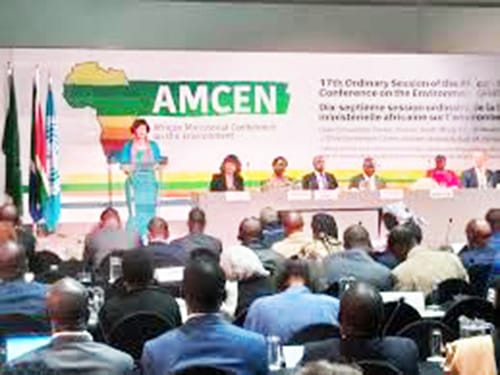By Shadrack Nyakoe
As the curtain comes down on the 10th Special Session of the African Ministerial Conference on the Environment (AMCEN) in Abidjan, Côte d’Ivoire, another chapter begins.
Just around the corner is the COP29 in Baku, Azerbaijan, in November where the consolidated views from AMCEN will be presented with ambitious expectations, represented by the African Group of Negotiators (AGN).
At the heart of the Abidjan meeting is a push for more climate finance flows to Africa through sustainable channels that won’t load African economies with more debts.
The end goal is to strengthen the continent’s adaptation and mitigation defence systems against climate change and allow the countries to achieve a just transition.
This perspective mirrors that of Ministers from the 45 least developed countries (LDCs) who gathered in Lilongwe, Malawi, last week.
“Finance COP”
COP29 is aptly referred to as the “Finance COP.”
Nothing short of ambitious financial outcomes is expected.
African Ministers under AMCEN declared that a New Collective Quantified Goal (NCQG) on climate finance should be adopted, one that would require rich nations to mobilise a quantum of no less than $1.3 trillion per year for developing nations.
NCQG is a new financial target from the year 2025 onwards that developed countries, who are the biggest contributors to climate change, must avail to developing countries, replacing the previous commitment of $100 billion per year that they pledged in 2009 but failed to deliver on time.
Meanwhile, the LDCs, under the Lilongwe Declaration on Climate Change 2024, want the new climate finance goal to be science-based and reflective of the developing countries’ actual climate needs through increased public finance, predominantly delivered as grants.
The LDC Ministers put the finance needed by their countries to implement their current climate goals to be at least $1 trillion.
Also, they hold that only concessional finance should be included as climate finance and must be easily accessible.
Grants and concessional finance are crucial, in particular for adaptation and loss and damage, given that it is the rich nations that have historically caused the unsustainable build-up of greenhouse gases in the atmosphere, stoking global warming to dangerous levels.
It is COP29’s role to deliver a financing deal geared towards achieving the goals set in previous COPs—Glasgow, Sharm el-Sheikh and Dubai, AMCEN Ministers note.
It should also be responsive to the evolving needs of the respective countries’ climate action plans, including their Nationally Determined Contributions (NDCs) and National Adaptation Plans (NAPs), while reflecting the global stocktake outcomes and latest scientific and technological advancements.
To avoid missteps associated with previous pledges, the AMCEN and the LDC Ministers are calling for the new finance goal to contain predictable, time-bound and reliable financial commitments from each of the developed countries.
Both groups have made it clear that the new finance goal must be delivered by developed countries jointly, in a fair and equitable manner.
They have continually signalled the importance of burden-sharing arrangements among these countries to increase scale of finance and ascertain delivery of commitments.
Global finance reforms
Developing countries face a crippling debt crisis worsened by increasing climate impacts.
The Ministers from both groups are asking the international financial institutions (IFIs) and multilateral development banks (MDBs) to reform their funding approach towards less developed nations.
They should be more responsive to Africa’s needs, review their finance terms, and be more open to debt restructuring and relief on need basis, in what would unlock climate and development finance without pushing these countries deeper into unsustainable debt.
The Ministers have reiterated that climate finance should be given in form grants and not loans which have worsened the debt situation.
AMCEN and LDC Ministers want the Loss and Damage Fund to be urgently operationalised and capitalised, as well as the Santiago Network meant to connect vulnerable countries with global providers of technical assistance, knowledge and resources needed to address climate risks.
The LDC ministers, in particular, want the fund to be set up with modalities that enable rapid, simple and direct budget support to governments through national treasuries and ministries of finance, as well as to enable direct access for national and subnational entities.
The African Ministers have called for the reconsideration of the decision to host the Santiago Network in Geneva rather than Nairobi.
The LDC Ministers are pushing for the inclusion of a sub-goal on loss and damage in the NCQG.
Adaptation efforts
Similarly, the Ministers are asking for Global Goal on Adaptation (GGA) to be fully operationalised and ensure adequate adaptation response to protect people, livelihoods and ecosystems from natural disasters, with a special focus on finance, capacity building and technology transfer.
The amount of adaptation finance needed is about $360 billion annually, compared to about $18 billion that was available in 2019.
COP29, according to AMCEN leaders, should send the right policy signals on operationalising common but differentiated responsibilities and respective capabilities (CBDR&RC), which acknowledges the different abilities and share of responsibilities of each country in addressing climate change.
Read also:- KPA Boss Urges Farmers to Embrace Climate-Smart Agriculture
Additionally, the just transition framework should reflect the priorities of Africa, in particular green industrialisation, sustainable use and value addition of natural resources, as well as addressing energy poverty and clean cooking needs.
Iskander Erzini Vernoit, Director, Imal Initiative for Climate and Development stated: “The African Ministerial reconfirms the position of the African Negotiators, to call for USD 1.3 trillion per year in the new goal for climate finance, which aligns with the best available needs assessment literature.
Moreover, crucially, it stipulates that this should be mainly in the form of grants and concessional finance, and points to a need for the NCQG to specify a clear share for public grant finance.
The onus is now clearly on developed countries to come to Baku ready to provide the finance necessary to help the world to fulfil the Paris Agreement, or their commitment to the Paris Agreement will be in doubt.
African countries, as AMCEN notes, are already spending significant percentages of their GDP per year on climate change, despite not having caused this crisis, and so it is only right that the developed countries who are responsible for this crisis do the same.”



